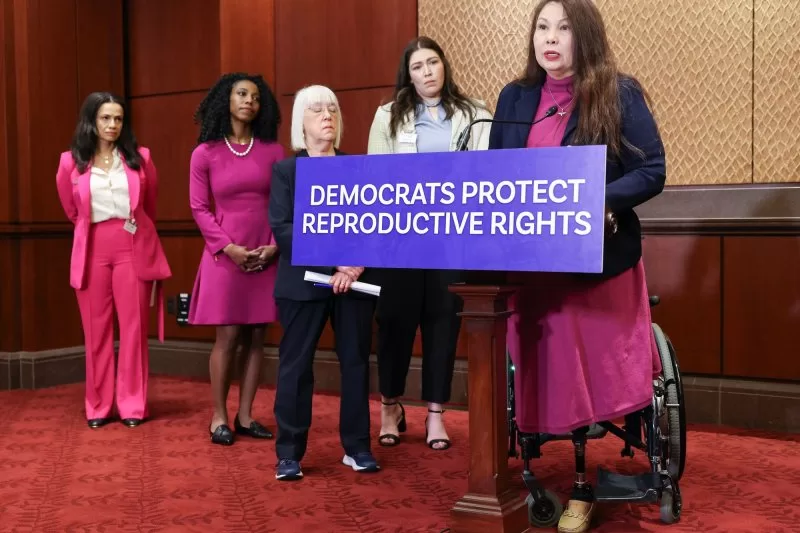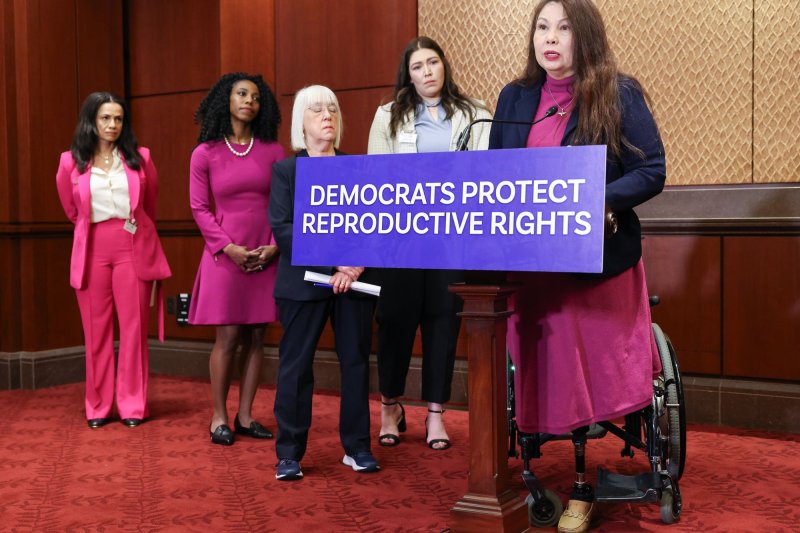1 of 3 | “If Donald Trump and Republicans want to protect people’s right to access IVF, they can vote yes on it,” Sen. Tammy Duckworth, D-Ill. said. “He’s shown that it only takes one sentence from him, and the Republican Party will fall in line behind him.” File Photo by Jemal Countess/UPI |
License PhotoSept. 17 (UPI) — The U.S. Senate will on Tuesday vote on another attempt to protect access to in vitro fertilization after a failed bid earlier this year.
The “Right to IVF Act,” introduced by Sen. Tammy Duckworth, D-Ill.; Sen. Patty Murray, D-Wash. and Sen. Cory Booker, D-N.J., seeks to protect in vitro fertilization, or IVF, and make the process more affordable.
The upper legislative body is expected to move to a roll call vote around 3:30 p.m. EDT on Tuesday.
“If Donald Trump and Republicans want to protect people’s right to access IVF, they can vote yes on it,” Duckworth told CBS News. “He’s shown that it only takes one sentence from him, and the Republican Party will fall in line behind him.”
Duckworth’s bill supersedes state laws that limit or otherwise interfere with its provision on fertility treatments. Specifically, under the bill, individuals would have the right to access fertility treatments and to make decisions about the use of their “reproductive genetic material,” otherwise known as embryos, without limitation or interference.
In February, the Alabama Supreme Court in a 7-2 vote ruled that frozen fertilized embryos are children under state law.
The ruling attracted criticism and worry over the potential legal consequences from civil rights and medical organizations which ultimately compelled Alabama’s Republican legislature to enact legislation that again protected IVF in Alabama which was signed in March by Gov. Kay Ivey, a Republican and the state’s second woman governor.
Tuesday’s vote is part of a larger push by Democrats to keep a national spotlight on the issue, particularly as November’s election inches closer — just under 50 days from Tuesday’s vote. But the legislative effort is likely to fail, similar to a vote in June on a Senate bill also sponsored by the three same Senate Democrats.
Though some, like Alaska’s Lisa Murkowski and Susan Collins of Maine, have crossed party lines to vote with Democrats on the issue, Senate Republicans have largely criticized past votes by their Democrat colleagues on similar bills and have characterized them as being mostly for political show.
On Monday, Senate Majority Leader Chuck Schumer, D-N.Y., began to apply pressure on Republicans ahead of Tuesday’s vote.
“We’re already beginning to hear the same tired and predictable and unconvincing excuses from our Republican colleagues looking for a way to vote against IVF protections,” Schumer said.
Speaking directly to his Republican colleagues across the Senate aisle, Schumer had said “if you truly support IVF, then vote for a bill that actually protects IVF through the letter of the law,” adding that Republicans “cannot claim to be pro-family on the one hand, while then voting against IVF protection bills on the other hand.”
However, both Republicans and Democrats put forward their own versions of a bill over the last several months they claim will protect IVF, including a past effort by Sen. Katie Britt, R-Ala., and Sen. Ted Cruz, R-Texas, and just this week by Sen. Rick Scott, R-Fl.
But the dueling political parties have continually failed to find a bipartisan solution and continually vote against each other’s legislation, with Republicans claiming Democrat bills go too far while Democrats say Republicans do not go far enough.
Meanwhile, Senate Republican Whip John Thune called Schumer’s planned vote on Tuesday a “show move” but expects “robust conversation” in the Republican conference.
Trump recently went so far as endorsing a mandate that either insurance companies or the federal government should pay for women’s IVF treatment and claimed he was “a leader on fertilization.”
“I don’t know of any Republicans not in favor of IVF,” Thune, R-S.C., said, adding the “mandate part” is “a challenging issue for lots of reasons, not the least of which is what it does to insurance costs.”
“We put a lot of mandates on insurance companies as it is already,” he said.

